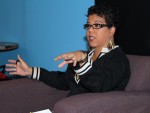Title
To cap off Hispanic Heritage Month, grassroots organizer, independent journalist, and hip-hop activist Rosa Clemente visited Juilliard on October 13 to speak about racism, identity, and politics. The event, “Modern Day Discrimination in the Age of Obama,” was hosted by the Office of Residence Life as part of its Horizons series, and it attracted nearly three dozen dance, drama, and music students to the 11th-floor lounge of the Meredith Willson Residence Hall.
Body
Clemente made history in 2008 when she was selected as the Green Party’s vice presidential running mate for Congresswoman Cynthia McKinney, Democrat of Georgia, the first presidential ticket to feature two women of color. Clemente had spent the previous decade at the forefront of the social justice movements, organizing around the struggles of what has been dubbed the hip-hop generation: African Americans born between the assassination of Malcolm X, in 1965, and the emergence of hip-hop as a cultural phenomenon, in the late ’70s and early ’80s.
The artists and activists at the core of this generation have targeted specific injustices infecting American society in the post-civil rights era, including minority and immigrant discrimination, inequitable education and transportation funding, police brutality, and a massive prison-industrial complex that continues to incarcerate young blacks at an increasingly high rate—the grim residue of centuries of slavery, disenfranchisement, and discrimination.
With these subjects permeating her consciousness as an undergraduate in the early ’90s, Clemente began to research Puerto Rican colonization, the trans-Atlantic slave trade, and the history of race relations in America, forcing her to confront the unresolved contradictions of her own ethnic and class identity.
“I’m thrust into this environment that is racist, and I’m learning about things about myself as a Puerto Rican woman that my parents didn’t even know,” Clemente said of her experiences in college and graduate school at the University of Albany and Cornell University, respectively. “I’m getting angry at what I’m learning.”
As a result of her growing disillusionment with the self-aggrandizing narratives of American exceptionalism, Clemente began to act on her convictions. In the mid-’90s she developed Know Thy Self Productions, an independent media agency meant to give a voice to the struggles of marginalized black youths around the country. Through the medium of hip-hop, Clemente has produced major activism tours meant to generate interest and excitement in social justice, featuring figures such as M-1 of the hip-hop duo Dead Prez; comedian Dave Chappelle; and Fred Hampton Jr., who is continuing the black nationalist tradition of his father, a Black Panther leader who was assassinated in 1969 by the Chicago police and the F.B.I.
“I went through these phases about being very angry, then coming to this understanding that this is our history,” Clemente said. “The history of people of color in this country is not always a history of oppression, it’s also a history of resistance.”
That combination of anger and resistance brought Clemente to a battered New Orleans in the wake of Hurricane Katrina to report on the desperate realities of lower-class communities deluged by both natural and corporate disasters. Working as an independent investigative reporter, Clemente presented a searing indictment of deliberate governmental neglect, including a memorable account of the juxtaposition of the jam-packed New Orleans Convention Center, where “the smell of dead bodies was overwhelming,” and the “completely habitable” Marriott, Wyndham, and Holiday Inn hotels standing vacant across the street, heavily guarded by police, military contractors, and Blackwater mercenaries.
“Journalism is something everyone can partake in, especially as an activist,” Clemente said, encouraging even Juilliard students without journalistic backgrounds to find their own megaphone. Taking the initiative to speak out on the injustices pervading our communities is of prime importance, she said. “You have to be a leader and organize, whether it’s through artistic expression, whether it’s through teaching young people [or] writing your truth and putting it out there. That’s critical.”
In light of Arizona’s controversial immigration bill (SB1070), the debates over the so-called ground-zero mosque, and the recent incidents of torture and suicides resulting from homophobic intimidation, young people today have a wealth of opportunities to stand up for principles of justice and equality That these incidents have occurred in spite of—or, to a certain extent, because of—the presence of an African American as commander-in-chief, demonstrates the extent to which a spirit of bigotry persists in popular consciousness despite lofty pronouncements about a “postracial society.”
“There’s still a certain undercurrent of racism in this country, particularly among those who are marginalized because they’ve lost their jobs,” Clemente said. “They’re dissatisfied, they feel disenfranchised. In any type of economic recession, people of color become the scapegoats; immigrants become the scapegoats; gays become the scapegoats.” The violence that follows from such scapegoating, she added, “is going to continue to happen in a time when we’re hearing xenophobic, racist, hateful language, particularly from the media. ... This rhetoric builds into public policy and eventually becomes law.”
Looking to the future, Clemente doesn’t see change happening within prevailing institutions or mainstream electoral politics, both of which can only function through systematic corporate constraint. When asked by a fourth-year dance student how progress can be made within the existing forms of government, she replied, “Well, I think for that you can’t go to the government. I think in your age, in your generation, many problems will have to be solved at the grassroots level.”





